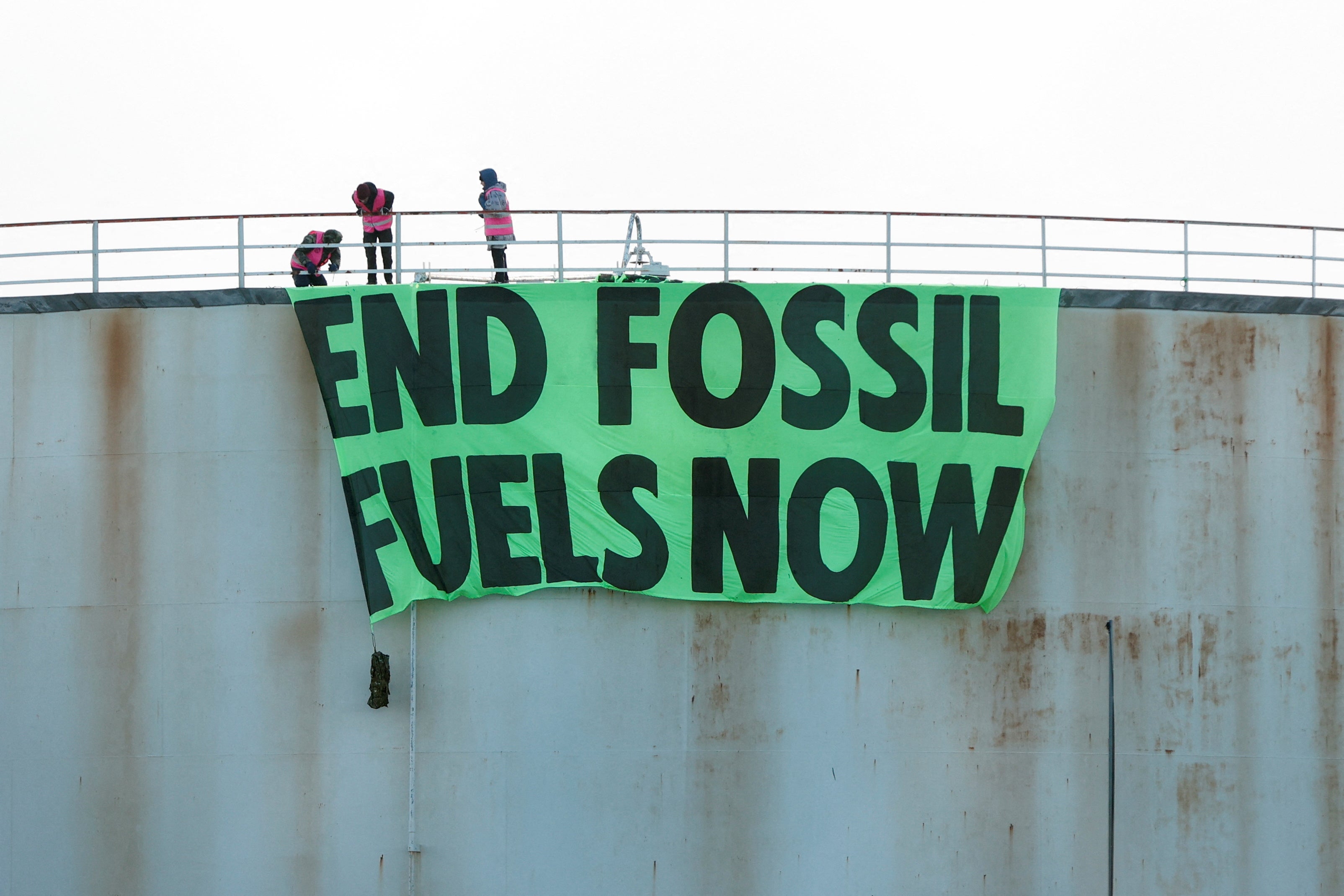‘Everything is at stake’: Extinction Rebellion plans further action as it blocks oil facilities
“The government is about to torch the Paris Agreement, it’s about to torch the future of our young people,” one activist said

Members of Extinction Rebellion said the UK government had left them no choice but to act against the fossil fuel industry Friday, and said they planned action that would be “more disruptive than ever” later this month.
The environmental movement said it had joined forces with new campaign group Just Stop Oil to block 10 oil facilities across the UK Friday, with activists climbing on top of fuel tankers, blocking sites with boats, and locking themselves onto barrels filled with concrete. The movement said the plan was to blockade the sites for as long as possible.
Tim Crosland, a former government lawyer turned Extinction Rebellion activist, said if in response to Russia’s invasion of Ukraine “vested interests” in the carbon economy prevail the damage would be irreversible.
“The government is about to torch the Paris Agreement, it’s about to torch the future of our young people, it’s about to torch the global south,” he told reporters Friday, referring to the energy decisions being made by the government in the wake of Russia’s invasion of Ukraine. “It’s about to torch the conditions which make the planet habitable and we cannot be bystanders to that.”
Crosland said he was aware that civil disobedience was a “blunt instrument” but said it was the best climate activists had to redirect attention “to where it needs to be” at this critical time.
The actions come amid a cost of living crisis in the UK, with a major hike in energy bills beginning Friday. It also comes ahead of the publication of the government’s delayed energy security strategy in which Boris Johnson is expected to lay out his plans to shift away from Russian fossil fuels and to ease the squeeze on British household budgets.
Mr Johnson has indicated that his plan will include an expansion of renewable and nuclear power, but will also include energy from UK fossil fuels. Green groups and climate campaigners have called for the government to accelerate its transition to renewables and better insulate British buildings, as a way of combatting the climate crisis and the cost of living at the same time.
Extinction Rebellion and other groups have called for an end to oil and gas extraction as soon as possible. They point to the fact that in its road map to a net zero energy system by 2050, the International Energy Agency advised that there should be no new oil and gas fields beyond 2021.
“For us to be aligned with a body like that, and not taking a more radical stance than a global institution like that, feels very serious to me,” Clare Farrell, co-founder of the movement, told reporters.
Crosland, the former government lawyer, said he was concerned Mr Johnson would allow further extraction of fossil fuels in the North Sea, and had travelled to Saudi Arabia to secure more oil production, advancing policies that are “inconsistent with maintaining the conditions on which the inhabitability of the planet depends.”
“These policies are being advanced by stealth under cover of crisis,” he said, just a few months after Mr Johnson told the world that Cop-26 in Glasgow was “one minute to midnight” in the battle against climate change. “Everything is at stake.”
On April 9, Extinction Rebellion said it would organise a mass gathering in central London to take its message to the government: “End fossil fuels now.”
From that day, Extinction Rebellion members would meet in Hyde Park daily, and would be holding “action briefings” to train members of the public tools such as how to talk to the police and how to block a road, the group said.
“We’ll be more disruptive than ever and we’ll be impossible to ignore,” said Andy Smith, an artist and activist. “In the tradition of nonviolent civil disobedience, we will disrupt business as usual until the government and big business make change.”
The actions Friday follow the publication of a United Nations science report in February that the world has “a brief and rapidly closing window of opportunity to secure a liveable and sustainable future for all.”
The UK has legally committed to reach net zero by 2050, meaning the country must cut its emissions by at least 100 per cent of the pollution it put into the atmosphere in 1990. When compared to 1990 levels, last year the UK’s emissions were some 47 per cent lower.
While this means the UK is close to halfway there, the UK’s independent Climate Change Committee has warned that the country is not on track to complete its next step of reducing emissions by 51 per cent by 2025.
A Government spokesperson said: “Criminal damage will not be tolerated and the police have taken swift action to prevent disruption to the public and industry.
“While we are working to drive down our use of expensive fossil fuels, there will continue to be ongoing demand for oil and gas over the coming decades while we transition to cheaper low carbon energy.
“As the Business Secretary has said, turning off our domestic source of gas overnight would put energy security, British jobs and industries at risk, leaving us more dependent on foreign imports.”
Join our commenting forum
Join thought-provoking conversations, follow other Independent readers and see their replies
Comments
Bookmark popover
Removed from bookmarks